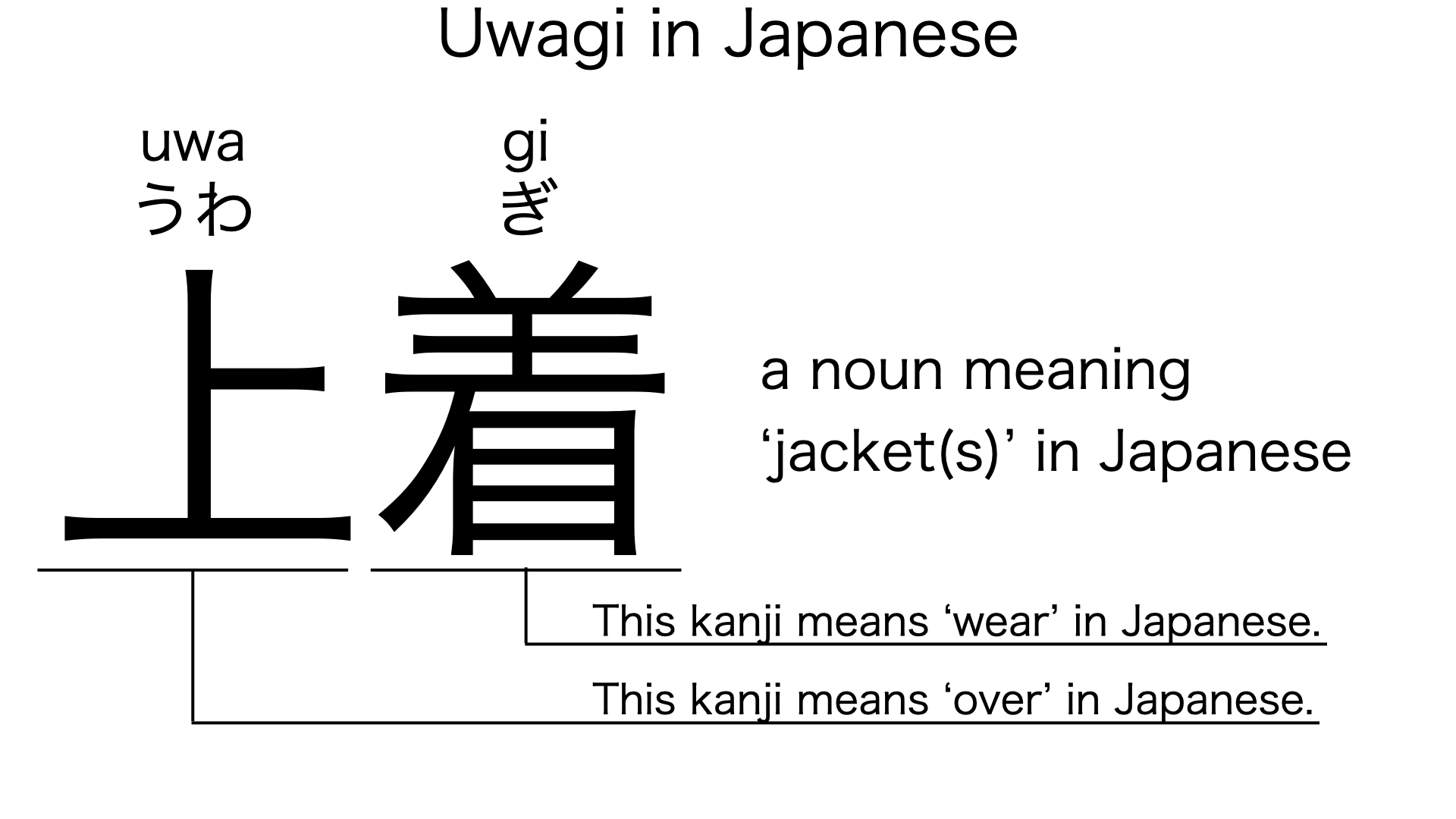What does “uwagi” mean in Japanese?
Native speakers say “uwagi” to mean ‘jacket’ in Japanese. Perhaps, some Japanese learners know this word as it is sometimes used in Japanese conversations. In this blog post, however, I will explain this word in detail based on its kanji expression. And also, I will explain how to use it through example sentences. My explanations would help Japanese learners understand “uwagi” more clearly. Then, let’s get started!
Contents
Definition and meanings of “uwagi”
Let me start with the definition and meanings of “uwagi”.
- uwagi – 上着 (うわぎ) : a noun meaning ‘jacket’ or sometimes ‘coat’ in Japanese. This can also work as plural. Learn more about Japanese plural.
The definition and meanings are simple and clear, I think. To understand this noun more clearly, however, let me explain its kanji characters in detail, one by one.
What does “uwagi” literally mean in Japanese?
The kanji expression of “uwagi” consists of the following two kanji characters:
- 上 : a kanji character sometimes used to mean ‘over’ in Japanese.
- 着 : a kanji character sometimes used to mean ‘wear’ in Japanese.
From these two kanji characters, we can understand that “uwagi” literally means ‘over wear’ in Japanese. This literal interpretation is not completely in line with the actual meanings, but still understandable, I think. Jackets and coats can often be considered as over wear.

When we meet new kanji expressions, we should check their kanji characters in detail to understand their meanings clearly and deeply. In many cases, kanji characters tell us a lot about the meanings of the expressions they form. Actually, here, we could get the better understanding of “uwagi” through the detailed kanji check above.
So far, I’ve explained the definition and meanings of “uwagi” together with its kanji characters. Then, let me explain how to use it through the example sentences below.
Example #1: how to say “jacket” in Japanese
boku wa atatakai uwagi wo kai tai – 僕は温かい上着を買いたい (ぼくはあたたかいうわぎをかいたい)
I want to buy a warm jacket.
Below are the new words used in the example sentence.
- boku – 僕 (ぼく) : a pronoun meaning ‘I’ in Japanese. This is used mainly by boys and young males.
- wa – は : a binding particle working as a case marker or topic marker. In the example, this works after “boku” to make the subject in the sentence.
- atatakai – 温かい (あたたかい) : an i-adjective meaning ‘warm’ in Japanese.
- wo – を : a case particle used to make the object word in a sentence. In the example, this is used after “atatakai uwagi” to make the object in the sentence.
- kai – 買い (かい) : one conjugation of the verb, “kau“, which means ‘to buy’ in Japanese. In the example, it has been conjugated for the better connection with its following word.
- tai – たい : an auxiliary verb used after a verb to make its desire form. In the example, this is used after “kai” to make its desire form, “kai tai”, which means ‘to want to buy’ in Japanese.
This is a typical usage of “uwagi”. In this example, it works together with the i-adjective, “atatakai”, to mean ‘warm jacket’ in Japanese.
Example #2: another usage of “uwagi”
kanojo no uwagi wa totemo kawaii desu – 彼女の上着はとても可愛いです (かのじょのうわぎはとてもかわいいです)
Her jacket is very cute.
Below are the new words used in the example sentence.
- kanojo – 彼女 (かのじょ) : a pronoun meaning ‘she’ in Japanese.
- no – の : a case particle used after a noun or pronoun to make its possessive case. In the example, this is used after “kanojo” to make its possessive case, “kanojo no”, which means ‘her’ in Japanese.
- totemo – とても : an adverb of degree meaning ‘very’, ‘much’, ‘so’, or such in Japanese. In the example, this works in front of “kawaii” to emphasize its meaning.
- kawaii – 可愛い (かわいい) : an i-adjective meaning ‘cute’ in Japanese.
- desu – です : an auxiliary verb used after a noun or adjective to make it polite. Probably, this is well known as a part of Japanese desu form. In the example, this is used after “totemo kawaii” to make it sound polite.
This is another typical usage of “uwagi”. In this example, it works together with the possessive case, “kanojo no”, to mean ‘her jacket’ in Japanese. When we want to mean a ‘jacket’ or ‘jackets’ in Japanese, anyway, this noun is always a very good option.
Summary
In this blog post, I’ve explained the definition and meanings of “uwagi” in detail based on its kanji expression. And also, I’ve explained how to use it through the example sentences. Let me summarize them as follows.
- uwagi – 上着 (うわぎ) : a noun meaning ‘jacket’ or sometimes ‘coat’ in Japanese. This can also work as plural. These two kanji characters literally mean ‘over wear’ in Japanese. This literal interpretation is not completely in line with the actual meanings, but still understandable, I think. Jackets and coats can often be considered as over wear.
Hope my explanations are understandable and helpful for Japanese learners.
Leave a Reply